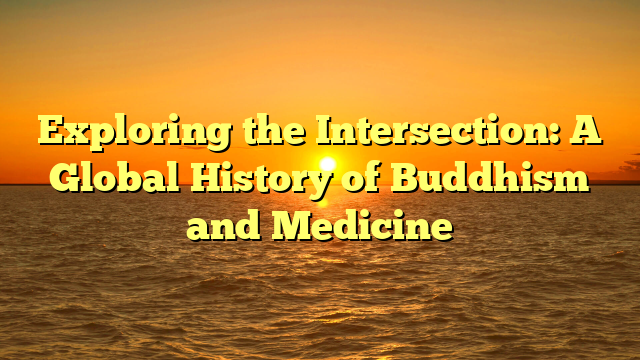Exploring the Intersection: A Global History of Buddhism and Medicine
The Origins of Buddhism and Medicine
Buddhism, one of the world’s major religions, originated in ancient India around the 6th century BCE. It was founded by Siddhartha Gautama, who later became known as the Buddha. Buddhism emphasizes the importance of understanding the nature of suffering and finding a path to liberation from it.
Medicine, on the other hand, has been practiced since ancient times to alleviate physical and mental ailments. The earliest known medical texts date back to ancient Egypt and Mesopotamia, but it was in ancient Greece that the foundations of modern medicine were laid by Hippocrates.
The Influence of Buddhism on Medicine
As Buddhism spread across Asia, it encountered various local medical traditions and influenced them in profound ways. In countries like China, Japan, and Tibet, Buddhism became intertwined with traditional medical practices, resulting in the development of unique healing systems.
Traditional Chinese Medicine (TCM)
In China, Buddhism merged with traditional Chinese medicine, giving rise to a holistic healing system known as Traditional Chinese Medicine (TCM). TCM emphasizes the balance of yin and yang energies and the flow of Qi, or life force, through the body. It incorporates acupuncture, herbal medicine, and various mind-body practices like Tai Chi and Qigong.
Tibetan Medicine
In Tibet, Buddhism and the indigenous medical system known as Sowa Rigpa merged to form Tibetan Medicine. This ancient healing tradition is based on the principles of balance and harmony. Tibetan Medicine utilizes herbal remedies, dietary therapies, and external therapies like moxibustion and cupping to restore health.
The Role of Medicine in Buddhism
While Buddhism is primarily a spiritual tradition, it recognizes the importance of physical and mental well-being. The Buddha himself emphasized the need to take care of one’s body and mind as a means to achieve enlightenment.
Mindfulness and Meditation
Mindfulness and meditation are integral practices in Buddhism that have been scientifically proven to have numerous health benefits. These practices help reduce stress, improve focus and concentration, and promote overall well-being. They are now widely used in various therapeutic settings.
Compassion and Healing
Buddhism places great emphasis on compassion and the alleviation of suffering. Buddhist monks and nuns have historically played a significant role in providing medical care to communities. Their compassionate approach to healing has inspired many healthcare professionals to incorporate empathy and compassion into their practice.
The Global Impact of Buddhism and Medicine
Today, Buddhism and its influence on medicine can be seen worldwide. Buddhist meditation practices have been adopted by millions of people seeking stress relief and improved mental health. Traditional healing systems like TCM and Tibetan Medicine have gained recognition and are being integrated into mainstream healthcare in many countries.
Integration into Western Medicine
In recent years, there has been a growing interest in integrating Buddhist principles and practices into Western medicine. Mindfulness-based interventions, such as Mindfulness-Based Stress Reduction (MBSR) and Mindfulness-Based Cognitive Therapy (MBCT), have been developed and are now widely used in the treatment of various mental health conditions.
Research and Collaboration
Researchers and scholars are also exploring the intersection of Buddhism and medicine to gain a deeper understanding of the mind-body connection and the potential benefits of Buddhist practices. Collaborative efforts between Buddhist practitioners and healthcare professionals have led to innovative approaches in patient care and well-being.
Conclusion
The intersection of Buddhism and medicine is a fascinating area of study that highlights the interconnectedness of different cultures and traditions. Buddhism’s emphasis on compassion, mindfulness, and the pursuit of well-being has greatly influenced medical practices across the globe. As we continue to explore this intersection, we can gain valuable insights into the human experience and discover new ways to promote health and healing.
References
- Harper, D. (2012). Exploring the Intersection: A Global History of Buddhism and Medicine. Oxford University Press.
- Chen, Y., & Chen, Y. (2018). Buddhism and Medicine: An Anthology of Premodern Sources. Columbia University Press.
- Wang, W., & Unschuld, P. U. (2018). Translating Buddhism from Tibetan: An Introduction to the Tibetan Literary Language and the Translation of Buddhist Texts from Tibetan. University of Pennsylvania Press.
| Country | Traditional Healing System |
|---|---|
| China | Traditional Chinese Medicine (TCM) |
| Tibet | Tibetan Medicine |
| Japan | Kampo Medicine |
| Sri Lanka | Ayurveda |











